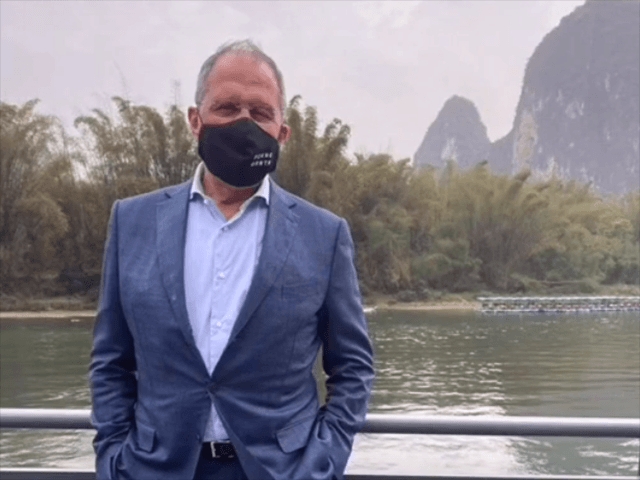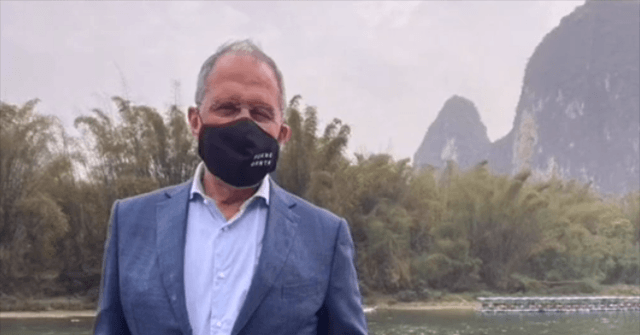
Russian Foreign Minister Sergei Lavrov wore a black mask reading “FCKNG QRNTN” while on a tour of southeastern China’s Lijiang River on Monday.
Lavrov posed for a short video in the black mask while standing on the deck of a boat as it glided through Lijiang’s waters. The mask’s English-language slogan had all the vowels removed to read, “FCKNG QRNTN.” The message apparently conveyed the minister’s attitude to Chinese coronavirus quarantines and lockdowns, which Russia has largely refused to impose on its population since last spring – but his host country implemented vigorously.
?? FM Sergey #Lavrov during his visit to #China ?? pic.twitter.com/ODNa72Pq7B
— MFA Russia ?? (@mfa_russia) March 22, 2021
“Pool journalists gave S.V. Lavrov a mask. Both the mask and the text suit the minister just right,” Russia’s Foreign Ministry wrote in a caption accompanying an official upload of the video clip to the Chinese video-sharing app TikTok.
Members of the press pool covering Lavrov’s visit to China gifted the mask to the foreign minister on the occasion of his 71st birthday on Sunday, according to the Russian daily newspaper Rossiiskaya Gazeta.
“Making a river walk, Lavrov was photographed on the deck wearing a mask that journalists had given him the day before in honor of his birthday. The mask jokingly describes an attitude towards the quarantine measures imposed around the world due to the coronavirus pandemic,” the newspaper wrote.
Subsequent video footage from Lavrov’s river excursion published by Rossiiskaya Gazeta showed him gathered with several other people on the boat’s top deck; neither Lavrov nor any of his boating companions wore masks. When Lavrov met with Chinese Foreign Minister Wang Yi later on Monday and Tuesday, he donned a disposable sanitary mask without any slogans for certain press appearances but also appeared without a mask during face-to-face meetings.
Russian Foreign Minister Lavrov is sightseeing in Guilin, Guangxi, and Chinese tourists have waved to him。@neccamc1 @colonelhomsi @GeromanAT @Sunkway_China pic.twitter.com/8f2LujArhK
— 海岸猎人32(SFAC) (@shuixiang32) March 22, 2021
Lavrov arrived in China on March 22 for a two-day visit with Chinese Foreign Minister Wang Yi to discuss Russia-China cooperation on regional and international issues. The talks took place in the city of Guilin, located in southern China’s Guangxi Zhuang Autonomous Region, which borders Vietnam.
The two top ambassadors discussed their countries’ plans to cooperate on Chinese coronavirus vaccine efforts on Tuesday and said they both opposed “the politicization of Covid-19 [Chinese coronavirus] vaccines,” according to the state-run China Global Television Network (CGTN).
“I would like to stress that China is not trying to engage in ‘vaccine diplomacy.’ On the contrary, we are doing humanitarian work. Unlike some countries which are hoarding the vaccines for their own interests, we want to see more people immunized. Our hope is for the world to beat the pandemic as soon as possible,” Wang said at a press conference.
“I firmly support what Minister Wang Yi just said. Because of COVID-19 [Chinese coronavirus], our two countries have set a good example in our cooperation in this regard, and our cooperation is going to continue. We also talked about vaccines today in our discussions, and our two countries maintain close communication in terms of vaccination,” Lavrov said.
Both China and Russia have approved domestically-made coronavirus vaccine candidates for emergency use in their countries’ vaccine drives. China’s CoronaVac, developed by the state-run pharmaceutical company Sinovac Biotech, has an efficacy rate of 50.38 percent against the Chinese coronavirus. Russia’s Sputnik V, developed by Moscow’s Gamaleya Institute, has an efficacy rate of 92 percent according to late-stage clinical trials released in February. The shot was rushed through approvals for emergency use in Russia six months before its clinical data was released, however, causing many observers to doubt its efficacy and safety. China approved a second state-made coronavirus vaccine candidate for emergency use in the country without releasing its efficacy or safety data on March 15.
Beijing and Moscow have since offered their state-made vaccines to foreign countries for use in their own coronavirus vaccine drives. The Kremlin said last week that foreign countries were facing “unprecedented” pressure to reject the Russian-made coronavirus vaccine candidate, Sputnik V.
“In many countries the scale of pressure is quite unprecedented … such selfish attempts to force countries to abandon any vaccines have no prospects,” Kremlin spokesman Dmitry Peskov told reporters on March 16.
“We believe that there should be as many doses of vaccines as possible so that all countries, including the poorest, have the opportunity to stop the pandemic,” he said.
The Kremlin spokesman made the remarks after he was asked to comment on a recent U.S. government report that seemingly confirmed U.S. attempts to dissuade Brazil from purchasing doses of Sputnik V. The report was published on the U.S. Department of Health and Human Services’ website in January and outlined the U.S. Office of Global Affairs efforts to combat “malign influences in the Americas.”
“Examples include using OGA’s Health Attaché office to persuade Brazil to reject the Russian COVID-19 [coronavirus] vaccine,” the report read.





